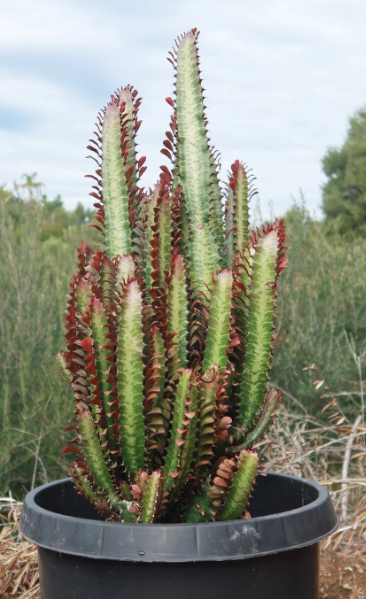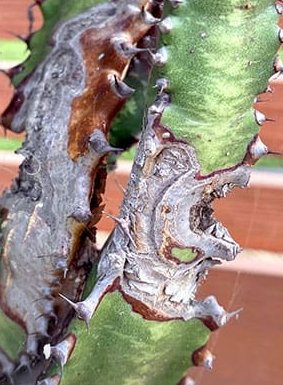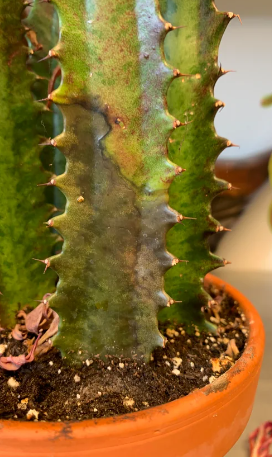African Milk Tree Plant
African Milk Tree (Euphorbia trigona) is a succulent growing 3-6 feet tall, hardy in USDA zones 10-11, with fast growth in well-drained, sandy soil, requiring full sun and low moisture, and it is neither edible nor medicinal.

Habit
Succulent
Height
3-6 ft
Growth
Fast
Soil
Well-drained, sandy
Shade
Full sun
Moisture
Low
Edible
No
Medicinal
No
Origin
Africa
Climatic Condition
Arid, Dry
Temperature (°)
20-40°C
Humidity (%)
20-50%
Potting media
Cactus Mix
Fertilizers
Low Nitrogen(5:10:5)
Watering
Low, Drought Tolerant
Plant Weight
500-1000 g
Flowering Time
Rarely Flowers
Soil Ph level
5.5-7.5
Water Ph level
6.0-7.5
Soil EC
0.8-1.5 dS/m
Yield Per Plant
Ornamental
NPK ratio
10:10:10
life Span
10-20 yrs
Health Benefits
Suggested Grow Media or Potting Mix ?
40% cactus mix, 30% perlite, 30% sand
Suggested Fertigation/Fertilizers
Fertilize every 4 weeks with a cactus fertilizer.
Common Diseases and Remedies
Root Rot, Powdery Mildew, Aphids, Mealybugs, Leaf Spot
Improve soil drainage, prune affected parts, use insecticidal soap
Systemic fungicides, insecticides, chemical treatments
HEALTH BENEFITS
The African milk plant (commonly known as Euphorbia tirucalli, also called "pencil plant") is a succulent plant that has been used in traditional medicine across Africa and other regions. While scientific research on its health benefits is limited, here are some of the potential uses and benefits that have been suggested:
- Antioxidant properties: Some studies suggest that extracts from the plant have antioxidant properties, which can help neutralize harmful free radicals in the body, reducing oxidative stress and potentially lowering the risk of chronic diseases.
- Anti-inflammatory effects: The plant has been traditionally used to treat inflammation. Its compounds may help reduce swelling and irritation in conditions like arthritis.
- Antimicrobial properties: Some research indicates that African milk plant extracts may have antimicrobial activity, potentially helping to fight off infections.
- Skin care: In traditional medicine, the plant's sap has been applied to the skin to treat conditions like warts, tumors, and other skin irritations. However, caution is advised, as the sap can be toxic and cause skin irritation if not used properly.
- Digestive health: The plant has also been used to treat digestive issues like constipation and intestinal parasites in some cultures.
However, it's important to note that the plant can be toxic if ingested improperly or if its sap comes into contact with the skin in large amounts. It's always best to consult with a healthcare professional before using any plant medicinally, especially those with limited scientific support

